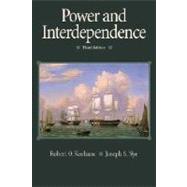
| Preface to First Edition | viii | ||||
| Preface to Second Edition | xi | ||||
| Preface to Third Edition | xv | ||||
| Part I Understanding Interdependence | 1 | (52) | |||
|
3 | (17) | |||
|
5 | (2) | |||
|
7 | (2) | |||
|
9 | (8) | |||
|
17 | (3) | |||
|
20 | (13) | |||
|
21 | (4) | |||
|
22 | (1) | |||
|
22 | (1) | |||
|
23 | (2) | |||
|
25 | (8) | |||
|
26 | (1) | |||
|
27 | (2) | |||
|
29 | (1) | |||
|
30 | (3) | |||
|
33 | (20) | |||
|
33 | (3) | |||
|
36 | (7) | |||
|
36 | (4) | |||
|
40 | (3) | |||
|
43 | (4) | |||
|
45 | (2) | |||
|
47 | (3) | |||
|
50 | (3) | |||
| Part II Regime Change in Oceans and Money | 53 | (90) | |||
|
55 | (31) | |||
|
57 | (18) | |||
|
58 | (5) | |||
|
63 | (12) | |||
|
75 | (10) | |||
|
76 | (2) | |||
|
78 | (2) | |||
|
80 | (3) | |||
|
83 | (2) | |||
|
85 | (1) | |||
|
86 | (26) | |||
|
86 | (11) | |||
|
86 | (5) | |||
|
91 | (4) | |||
|
95 | (2) | |||
|
97 | (1) | |||
|
97 | (12) | |||
|
99 | (4) | |||
|
103 | (1) | |||
|
104 | (2) | |||
|
106 | (1) | |||
|
107 | (2) | |||
|
109 | (3) | |||
|
112 | (31) | |||
|
112 | (2) | |||
|
114 | (6) | |||
|
115 | (2) | |||
|
117 | (3) | |||
|
120 | (6) | |||
|
121 | (3) | |||
|
124 | (2) | |||
|
126 | (6) | |||
|
128 | (3) | |||
|
131 | (1) | |||
|
132 | (5) | |||
|
137 | (6) | |||
| Part III Regimes and Two Bilateral Relationships | 143 | (48) | |||
|
145 | (46) | |||
|
146 | (5) | |||
|
151 | (5) | |||
|
156 | (13) | |||
|
169 | (5) | |||
|
174 | (2) | |||
|
176 | (6) | |||
|
182 | (9) | |||
| Part IV The United States and Complex Interdependence | 191 | (22) | |||
|
193 | (20) | |||
|
193 | (3) | |||
|
196 | (1) | |||
|
197 | (3) | |||
|
200 | (2) | |||
|
202 | (2) | |||
|
204 | (1) | |||
|
205 | (6) | |||
|
211 | (2) | |||
| Part V Globalism and the Information Age | 213 | (52) | |||
|
215 | (13) | |||
|
217 | (3) | |||
|
220 | (3) | |||
|
223 | (5) | |||
|
228 | (37) | |||
|
229 | (11) | |||
|
230 | (3) | |||
|
233 | (2) | |||
|
235 | (3) | |||
|
238 | (2) | |||
|
240 | (9) | |||
|
240 | (3) | |||
|
243 | (2) | |||
|
245 | (2) | |||
|
247 | (2) | |||
|
249 | (3) | |||
|
249 | (2) | |||
|
251 | (1) | |||
|
252 | (13) | |||
|
252 | (2) | |||
|
254 | (3) | |||
|
257 | (1) | |||
|
258 | (7) | |||
| Part VI Second Thoughts on Theory and Policy (1989) | 265 | (2) | |||
| Afterword | 267 | (21) | |||
|
267 | (5) | |||
|
272 | (9) | |||
|
273 | (2) | |||
|
275 | (3) | |||
|
278 | (3) | |||
|
281 | (3) | |||
|
284 | (3) | |||
|
287 | (1) | |||
| Two Cheers for Multilateralism | 288 | (13) | |||
|
290 | (2) | |||
|
292 | (6) | |||
|
292 | (1) | |||
|
293 | (1) | |||
|
294 | (1) | |||
|
295 | (1) | |||
|
295 | (1) | |||
|
296 | (1) | |||
|
297 | (1) | |||
|
298 | (3) | |||
|
299 | (1) | |||
|
299 | (1) | |||
|
299 | (2) | |||
| Notes | 301 | (25) | |||
| Index | 326 |
The New copy of this book will include any supplemental materials advertised. Please check the title of the book to determine if it should include any access cards, study guides, lab manuals, CDs, etc.
The Used, Rental and eBook copies of this book are not guaranteed to include any supplemental materials. Typically, only the book itself is included. This is true even if the title states it includes any access cards, study guides, lab manuals, CDs, etc.